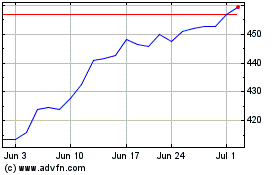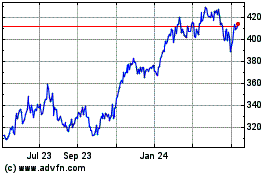SEOUL—Samsung Electronics Co. said Thursday that it would buy
U.S. cloud services company Joyent Inc. for an undisclosed sum,
underscoring its willingness to snap up outside companies as it
beefs up the software and services around its core mobile-phone
business.
Samsung's acquisition of San Francisco-based Joyent signals the
South Korean technology giant's burgeoning interest in "big data,"
part of a broader effort to use powerful remote computers to
bolster its data analysis and the computing capabilities of its
devices.
Samsung said in a statement it will integrate Joyent into its
mobile division, though the 11-year-old company will retain both
the Joyent name and its top management, and operate at an arm's
length from its new parent company.
Joyent, which counts Silicon Valley investor Peter Thiel as an
early backer, is Samsung's third major acquisition of a U.S.
startup in the past two years, after deals to acquire SmartThings,
a startup that helps connect home appliances to one another, for
about $250 million, and LoopPay, a developer of mobile payment
technologies, for about $160 million. LoopPay now forms the basis
for Samsung Pay, the Suwon, South Korea-based company's mobile
payment system.
Joyent competes with Amazon.com Inc.'s Amazon Web Services and
Microsoft Corp.'s Azure in renting out the use of computer servers
and data centers to third-party companies.
While the deal would bring revenue streams from Joyent's outside
clients under Samsung's roof, Samsung didn't make the acquisition
to generate sales from web services, said Injong Rhee, chief
technology officer of Samsung's mobile division, who oversaw the
deal.
Instead, Mr. Rhee said in an interview that Samsung is acquiring
Joyent as a growing user of cloud computing services itself, and
will effectively become Joyent's largest client. Samsung currently
relies heavily on Amazon and Microsoft for cloud services, and
adding Joyent would give it another source of processing power,
while giving Samsung a direct stake in the field of cloud services,
he said.
"We've traditionally been more focused on hardware, but you're
going to see more focus on software and services," Mr. Rhee
said.
Technologies like virtual reality and artificial intelligence,
which require more computational muscle than many smartphones and
other mobile devices can handle, are increasingly being powered by
remote cloud services, with the handset itself becoming a mere
"interface device," Mr. Rhee said.
Samsung's forays into virtual reality include a partnership with
Facebook Inc.'s Oculus unit, which uses Samsung smartphones that
strap into headsets.
Samsung also sees value in using cloud services to collect and
analyze data generated by its devices, which Mr. Rhee said could be
used to make personalized recommendations for its users, which
would make Samsung's products more attractive to potential
consumers.
"Big data is going to be a huge initiative for Samsung," Mr.
Rhee said. "Samsung devices will be increasingly intelligent, and
big data is really a key component of intelligence and
personalization."
Even so, the immediate benefit to Samsung in making the
acquisition is to boost device sales, Mr. Rhee said.
He compared the deal to Samsung Pay, which the company rolled
out in a sixth country, Singapore, on Thursday as a free service,
and which it doesn't yet have plans to profit directly from.
Traditionally, Samsung has been shy to pull the trigger on big
acquisitions, preferring instead to develop its own technologies in
house. It has struggled to integrate acquisitions in the past, and
its deal to acquire Palo Alto, Calif.-based streaming music startup
mSpot in 2012 was poorly regarded internally, according to people
familiar with the matter. The mSpot acquisition eventually led to
Samsung's launch of its Milk Music service, which has shut down in
some markets.
As a result, it has taken a lighter touch to its acquisitions,
for example allowing SmartThings to operate relatively
independently.
Mr. Rhee said that Samsung is planning to take a similar
approach with Joyent, though how much independence Samsung would
allow each of its acquisitions would vary on a case-by-case
basis.
As with its other recent acquisitions, Samsung's U.S.-based
Global Innovation Center initiated the deal after more than year of
conversation with Joyent, with acquisition talks starting in
earnest in April, according to Jacopo Lenzi, a San Francisco-based
senior vice president for Samsung's Global Innovation Center. The
deal ultimately won approval from D.J. Koh, Samsung's new mobile
chief.
"Samsung brings us the scale we need to grow our cloud and
software business," said Scott Hammond, CEO of Joyent, in a
statement.
Write to Jonathan Cheng at jonathan.cheng@wsj.com
(END) Dow Jones Newswires
June 15, 2016 23:25 ET (03:25 GMT)
Copyright (c) 2016 Dow Jones & Company, Inc.
Microsoft (NASDAQ:MSFT)
Historical Stock Chart
From Mar 2024 to Apr 2024

Microsoft (NASDAQ:MSFT)
Historical Stock Chart
From Apr 2023 to Apr 2024
